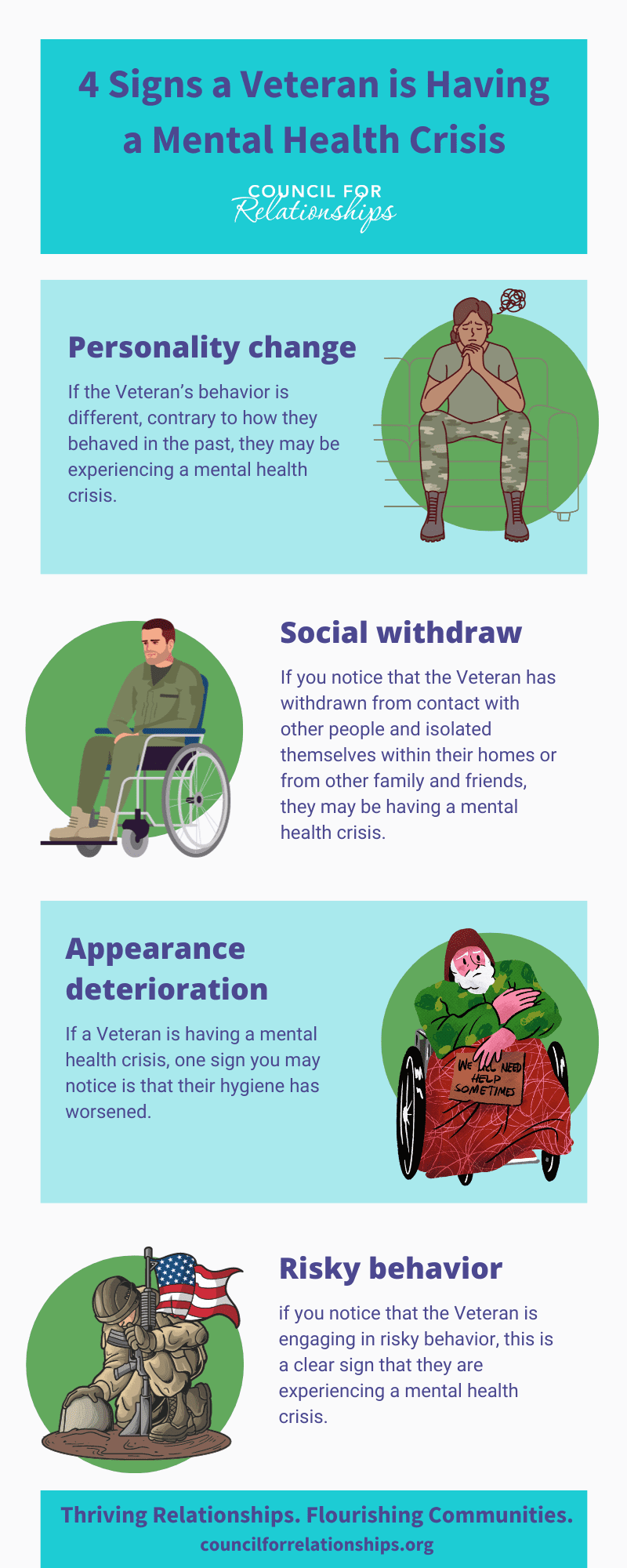How To Help a Veteran in Crisis: Veterans Day 2023
Veterans Day is November 11. It is a day for honoring veterans for their service to our country. What does honoring Veterans mean? You may even be confused as to how to celebrate Veterans Day. Celebrating and honoring Veterans requires more than saying, “Thank you for your service.” For example, you could celebrate Veterans Day and honor Veterans by attending a Veterans Day Parade, like I did this year in Philadelphia. Parade watchers who cheer on the participants show their support and appreciation. At the end of the Philadelphia Veterans Day 2023 Parade, there was a festival with 30+ veterans service organizations, food trucks, and live music for parade participants and watchers. Council for Relationships was there, spreading the word about our Operation Home and Healing program, which provides subsidized therapy for veterans and their families. How else can you show appreciation to the men and women who served? By learning how to help a Veteran in crisis.
Signs a Veteran is having a mental health crisis
If you know Veterans or Veteran-connected family members, here are some signs they may have mental health issues and could use your support to seek help.
#1 Personality change
One sign a Veteran is having a mental health crisis is that you notice that their personality may have changed. Perhaps their behavior is different, contrary to how they behaved in the past. Maybe they are angrier or sadder than they’ve been. Perhaps they seem more irritable or exhibit behaviors that don’t reflect the values you thought they held. Or they seem to be more anxious or easily agitated or less patient in interacting with others.
#2 Social withdraw
If you notice that the Veteran has withdrawn from contact with other people and isolated themselves within their homes or from other family and friends, they may be having a mental health crisis. Perhaps the Veteran does not participate in shared activities like they used to, whether it’s outings with the family, ballgames with neighbors and friends, or other pursuits they used to enjoy. Or, in more severe cases, they may stop going to work or school. The Veteran may even express ideas of hopelessness that life is overwhelming. The key sign is the change in behavior, from someone who participates in activities with family and friends or has an optimistic outlook to someone who withdraws from these activities and avoids interacting with friends and families.
#3 Appearance deterioration
If a Veteran is having a mental health crisis, one sign you may notice is that their hygiene has worsened. For example, the Veteran is not taking care of themselves, whether ignoring health conditions that need addressing or something as simple as wearing clean clothing. Again, what you notice is a behavior change.
# 4 Risky behavior
This may sound obvious, but if you notice that the Veteran or Veteran-connected family member is engaging in risky behavior, this is a clear sign that they are experiencing a mental health crisis. They could be abusing alcohol or drugs, driving while intoxicated, or exhibiting behavior that is potentially life-threatening to themselves or others. This behavior is contrary to what you’ve seen in the past.
How to help a Veteran in crisis
What can you do if a Veteran you know displays any of these signs? Reach out and offer them words of support and comfort. Help them seek professional help. Many programs in the Philadelphia region help veterans or family members address their mental health problems and change their behaviors.
We at CFR show our deep appreciation to Veterans and their families for their service through our commitment to improving the mental health of the military and Veteran communities. At CFR, the client registration process identifies those individuals who are Veterans and family members. Through the intake process, clients can be provided with therapists trained in military culture competency and Department of Defense and US Department of Veterans Affairs-approved, evidence-based therapies. Additionally, through Operation Home and Healing, CFR offers subsidized therapy for veterans of all eras with no restrictions related to discharge or past combat status. The subsidies are also open to Veteran-connected family members regardless of whether the Veteran is in therapy at CFR.
About the Author
Nancy Isserman, MSW, PhD, is the Director of Operation Home & Healing and the Co-Director of the Transcending Trauma Project. She is also co-author of Transcending Trauma: Survival, Resilience and Clinical Implications in Survivor Families.
If you have questions about how to help a Veteran in crisis, other Veteran mental health questions, how to celebrate Veterans Day 2023, or her extensive research on trauma and the Holocaust, you may reach Dr. Isserman at nisserman@councilforrelationships.org or 215-395-3140 ext. 3133.
See our Therapist & Psychiatrist Directory to find a CFR therapist or psychiatrist near you.




